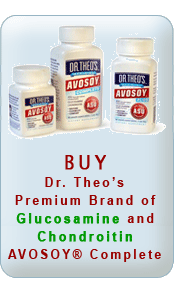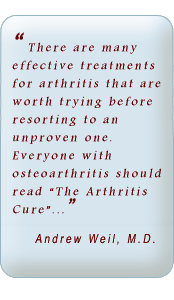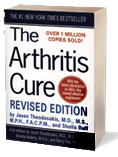Medical Evidence
Glucosamine Sulfate Compared To Ibuprofen
In Osteoarthritis Of The Knee Hans Muller-FaBbender,
Gerhard L. Bach, Wolfgang Haase, Lucio C. Rovati and Ivo Setnikar.Rheumazentrum,
Bad Abbach, Germany; Klinik Herzoghohe, Bayreuth, Germany; Institute
for Numerical Statistics GmbH, Koln, Germany; Department of Clinical
Pharmacology, Rotta Research Laboratorium, Monza (MI),
Italy
Summary: Glucosamine sulfate
is able to stimulate proteoglycan synthesis by chondrocytes and
has mild anti-inflammatory properties. In clinical trials, glucosamine
sulfate was more effective than placebo in controlling the symptoms
of osteoarthritis (OA). In order to better characterize this therapeutic
activity , we conducted a randomized, double-blind, parallel-group
study of glucosamine sulfate 500 mg t.i.d. vs ibuprofen 400 mg
t.i.d., orally for 4 weeks. The study included 200 hospitalized
patients with active OA of the knee, symptoms for at least 3 months
and a Lequesne's index of at least 7 points. Patients were evaluated
weekly. Response was defined as a reduction in the Lequesne's
index by at least 2 points if the enrolment value was higher than
12 points, or by at least 1 point if the enrolment value was 12
or less points, together with a positive overall assessment by
the investigator. The improvement tended to be sooner under ibuprofen
(48% responders vs 28% after the 1st treatment week; P = 0.06,
Fisher's Exact test), but there was no difference from the 2nd
week onward, with a success rate of 52% in the ibuprofen group
and of 48% in the glucosamine group (P = 0.67) at the end of treatment.
The average Lequesne's index at enrolment was around 16 points
and decreased by over 6 points in both groups, again with the
above described trend. On the other hand, 35% of patients on ibuprofen
reported adverse events, mainly of gastrointestinal origin, vs
6% adverse events with glucosamine (P < 0.001, Fisher's Exact
test). The number of adverse event related drop-outs was different
between the two groups (7% vs 1%, respectively; P = 0.035).
Results: Glucosamine sulfate
was therefore as effective as ibuprofen on symptoms of knee OA.
These data confirm glucosamine sulfate as a safe symptomatic Slow
Acting Drug for OA.
Source: Osteoarthritis and
Cartilage (1994) 2, 61-69
Dr. Theo's Comments: This
study, using oral glucosamine versus ibuprofen shows that glucosamine
was as effective in controlling pain from osteoarthritis but side
effects were six times more likely in the users of ibuprofen.
This is more evidence that glucosamine should be used before an
anti-inflammatory medication for treating osteoarthritis.




